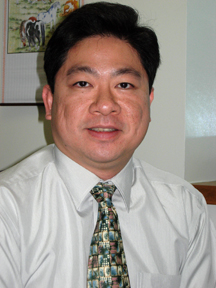 |
Li-Wu Chen, Ph.D. |
The two-year grant will evaluate Nebraska’s recent change from single-county health departments to a regional system of multi-county public health departments.
“We will assess if this change has improved overall public health practice and performance in Nebraska and demonstrated advantages in areas, such as staffing, resource allocation and community partnership development,” Dr. Chen said.
“Nebraska is unique in that we have 20 local public health agencies to cover 93 counties. In other states, one local public health agency usually covers only one county. But, our population is so spread out that one local agency can cover from two to nine counties,” he said.
In 2001, the Nebraska Legislature approved an annual appropriation of $5.7 million from the Tobacco Settlement Fund to build its public health infrastructure across the state. Before that, local public health departments covered only 22 of the state’s 93 counties. By 2002, 16 new regional public health departments were formed.
Dr. Chen and his team hypothesize that a regional approach could have advantages for states like Nebraska due to the relatively small population base and large geographic area. Results of this study will be used to inform federal and state policymakers about the lessons learned through Nebraska’s experience with a regional public health agency model, so that performance of public health practice can be improved.
Dr. Chen has had more than 10 years of experience in conducting health services research, especially in the area of health economics. At UNMC for nine years, he has had a leadership role in conducting research in the areas of hospital finance, health care cost and efficiency, economic evaluation of health care, access to health care and economic analysis of health policy.
The project’s co-investigator, David Palm, Ph.D., is the administrator of Nebraska’s state public health office. He has been heavily involved in the planning, design and implementation of Nebraska’s regional public health departments.
The project’s consultant, Keith Mueller, Ph.D., professor and associate dean for academic affairs in UNMC’s College of Public Health, is a nationally known researcher in rural health policy and has done extensive research in rural health care delivery systems.
The project team also includes two health data analysts, Sara Roberts and Michelle Mason, and one graduate research assistant, Jennifer Black.
Dr. Chen’s project was one of six new RWJF grants established to explore the impact of specific public health strategies on the quality and performance of the United States public health system.
These projects represent the foundation’s latest investment in a four-year funding commitment to build the field of public health systems research through investigator-initiated research grants. With these awards, RWJF has invested more than $3 million toward this effort.
“We are encouraged by the enthusiasm for advancing this field and we are very pleased to invest in these six important research projects,” said James S. Marks, M.D., RWJF senior vice president and director, health group. “These grants present opportunities to identify successes in public health practice, understand why they are succeeding and apply that knowledge broadly across the country.”
The grants are administered through the Changes in Health Care Financing and Organization (HCFO) initiative, an RWJF program managed by AcademyHealth.
HCFO strives to bridge the health policy and health services research communities by reaching two primary objectives: to provide public and private decision-makers with usable and timely information on health care policy, financing and market developments; and to bring together the policy and research communities through significant convening, issues identification, research translation, and communication activities. Through the special topic solicitation in Public Health Systems Research, HCFO supports investigator-initiated research examining the organization, financing, and delivery of public health services and the impact of these activities on population health.